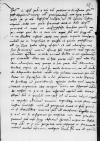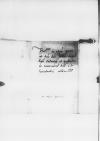Nec opus quidem, censeo, Reverendissimae Paternitati Vestrae diffusius recensere, cum illi optime constat maximam aetatis meae partem serviens meis in aula serenissimi ⌊principis et regis⌋ mei consumpsisse, beneficia quaecumque accepi, accepi gratia Dei et sacrae maiestatis regiae, domini mei semper clementissimi [...] paper damaged⌈[...][...] paper damaged⌉ commodius restantem aetatis meae partem in quiete transigere valeam, quae in longissima et pacifica et quieta possessione ad 19 annos habui eisdemque usus sum. Et nunc adversarii mei sive fortunarum mearum osores sibi lacessandi viam apertam aestimantes, quendam in ⌊urbe⌋ ⌊Quirinum Galler⌋ in me excitaverunt, qui citationem contra me in has partes misit, quam ultra annum idem adversarii mei, quorum in hac parte dominus ⌊Alexander Sculteti⌋ caput est, apud se occulte detinuerunt, ac iam tandem ille Alexander Sculteti eandem mihi praesentare curavit, qua mandatur, ut sexagesima die a die praesentationis in urbe compaream, de iuribusque cum parte adversa Quirino Galler agam. Accepta citatione in procinctu iter arripui contulique me Ilspargam volens(?) do avisare Reverendissimam Paternitatem Vestram et hoc insperatum negotium volui dicere tamquam domino et praesuli meo, quam cum non inveni, redii ad tergum et expedivi ad curiam Romanam impensasque incepi facere. Maluissem convertisse easdem ad pauperes amicos et fratres, quorum non est contemnendus numerus, quam ad curtisanos. Supplico Reverendissimae Paternitati Vestrae, ut se in suprema hac necessitate mea eum praestet patronum, quem mihi semper affuturum sperabam, in quo nec diffido meque eidem Reverendissimae Paternitati Vestrae perpetuis meis obsequiis et fortunarum mearum viribus conservabo. Reliqua commisi fratri meo ad referendum
 AAWO, AB, D.5, f. 65v
Reverendissimae Paternitati Vestrae. Quam ⌊Christus Ihesus⌋ servet quam diutissime sospitem semperque incolumem.
AAWO, AB, D.5, f. 65v
Reverendissimae Paternitati Vestrae. Quam ⌊Christus Ihesus⌋ servet quam diutissime sospitem semperque incolumem.
 AAWO, AB, D.5, f. 1v unnumbered after f. 65
AAWO, AB, D.5, f. 1v unnumbered after f. 65
 AAWO, AB, D.5, f. 65v
Reverendissimae Paternitati Vestrae. Quam
AAWO, AB, D.5, f. 65v
Reverendissimae Paternitati Vestrae. Quam 

